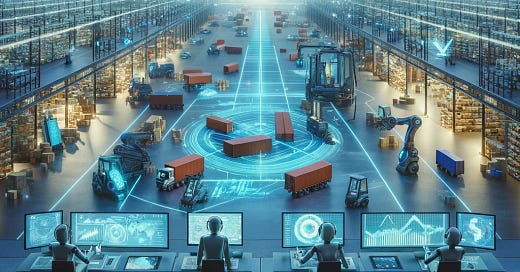#87 How AI is Changing the Game in Supply Chain Management
Figure 1: Role of AI in Revolutionizing Supply Chain Management
In today's bustling market, the ability to stay ahead of the curve spells the difference between success and falling by the wayside. And who would've thought that the key player pushing companies to the front lines would be Artificial Intelligence (AI)? Let's dive into the fascinating world of supply chain management and discover how AI is flipping the script, making operations smoother, more efficient, and somehow, a bit more human.
The Power of Predictive Analytics
In a world where yesterday's science fiction becomes today's reality, AI's capabilities in predictive analytics feel like having a crystal ball, but better. It's not about vague predictions; it's about data-driven, precise forecasts that can significantly sway decision-making processes in supply chain management.
Understanding Predictive Analytics
Predictive analytics isn't a new kid on the block, but integrate it with AI, and it's like it's had a cup of coffee too many – supercharged. By examining massive data sets, AI algorithms detect patterns and trends that humans might overlook.
Demand Forecasting
Imagine being able to predict what your customers will need before they even know it themselves. That's the magic of AI in demand forecasting. It means less time guessing and more time providing. For businesses, this translates to optimized inventory levels, reduced waste, and happier customers.
Inventory Management: With insights gained from AI, businesses can maintain the Goldilocks level of stock – not too much, not too little, just right.
Labor Planning: Knowing peak times means being able to plan your workforce efficiently. No more understaffing or overstaffing dilemmas.
Logistical Planning: AI helps in routing, shipping, and delivering goods in the most efficient ways possible, often saving time and money.
Real-World Examples
Let me share a story that still makes me smile. A local bookshop owner friend of mine was struggling during the holiday season. Too many unsold books one year, and not enough the next.
With a basic predictive analytics tool, they were able to forecast the demand based on historical sales data and current market trends. The result? The right books, in the right amount, at the right time. Sales went up, waste went down, and stress levels? Well, let's just say there were more smiles all around.
Figure 1: A Decent Book Library
The Ripple Effect
The changes AI brings to supply chain management are not just about predicting what gets bought and when. It's also about reimagining how businesses operate on a fundamental level.
Customer Satisfaction: At the end of the day, being able to meet your customers' needs efficiently is what keeps them coming back.
Sustainability: With optimized logistics and inventory, the environmental impact of shipping and storing goods decreases.
Cost Reduction: Less waste, optimized routes, and efficient labor use all contribute to lower operating costs.
"Embracing AI in supply chain management doesn't just mean staying competitive; it means staying relevant."
Supplier Relationship Management
AI enhances supplier relationship management by providing tools for better analysis and communication. It can evaluate supplier performance, compliance, and risk levels, enabling businesses to make informed decisions. AI can also facilitate smoother communication between businesses and their suppliers, ensuring timely updates and collaborative problem-solving. This improved management leads to stronger, more reliable supply chains that can better withstand disruptions.
Challenges and Considerations
While the benefits of AI in supply chain management are clear, there are challenges to its implementation. These include the need for significant investment in technology and training, concerns about data privacy and security, and the potential for job displacement. Additionally, businesses must navigate the complexity of integrating AI with existing systems and processes.
Conclusion
In a marketplace that's more crowded and competitive than ever, AI stands out as a beacon of innovation, driving supply chain management into a new era. Predictive analytics, a cornerstone of AI's application, has already shown its value in optimizing inventory, labor, and logistics. But beyond these operational benefits, AI fosters a deeper understanding of customer needs, contributing to more sustainable practices and cost efficiency.
As we continue to navigate the waves of technological advancement, it's clear that the integration of AI in supply chain management is not just changing the game; it's setting new rules and allowing businesses to play smarter, not harder. So, let's lean into the future, embrace AI, and see where this remarkable journey takes us.
AI is undeniably changing the game in supply chain management, offering solutions that enhance efficiency, visibility, and resilience. By leveraging predictive analytics, enhancing supply chain visibility, automating operations, and improving supplier relationships, businesses can stay competitive in a rapidly evolving market. However, embracing AI requires careful planning, investment, and a commitment to addressing the challenges that come with digital transformation.
As AI continues to evolve, its role in supply chain management will undoubtedly grow, promising even more innovative solutions to the complex challenges of today's global supply chains.
#ArtificialIntelligence #MachineLearning #DeepLearning #NeuralNetworks #ComputerVision #AI #DataScience #NaturalLanguageProcessing #BigData #Robotics #Automation #IntelligentSystems #CognitiveComputing #SmartTechnology #Analytics #Innovation #Industry40 #FutureTech #QuantumComputing #Iot #blog #x #twitter #genedarocha #voxstar





